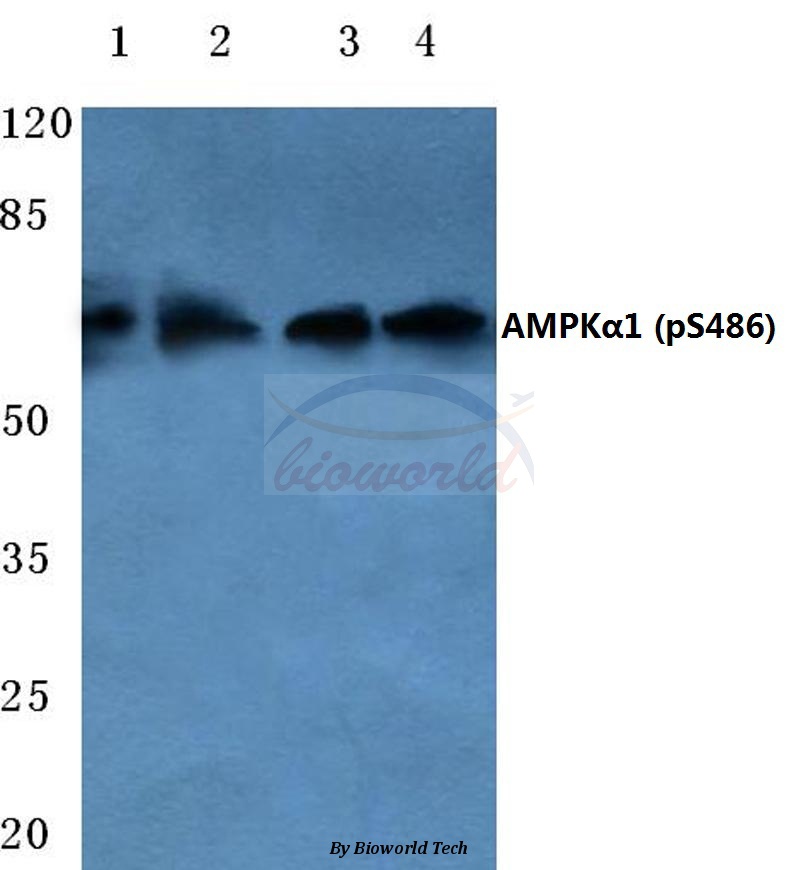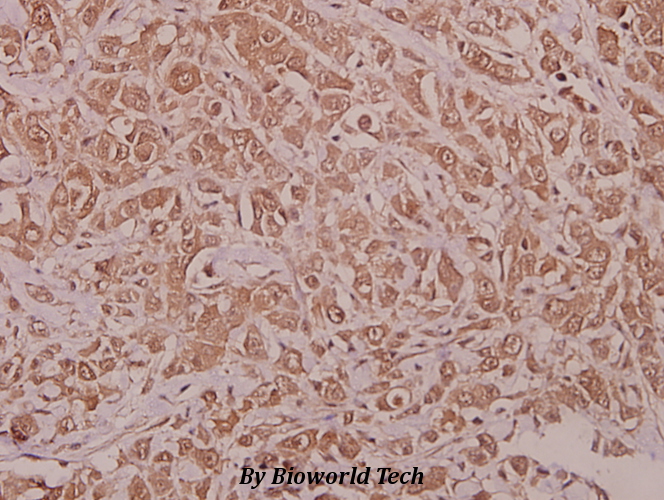Product Name :
AMPKα1 (phospho-S486) polyclonal antibody Background :
AMPK is a heterotrimeric complex comprising a catalytic α subunit and regulatory β and γ subunits. It protects cells from stresses that cause ATP depletion by switching off ATP-consuming biosynthetic pathways. AMPK is activated by high AMP and low ATP through a mechanism involving allosteric regulation, promotion of phosphorylation by an upstream protein kinase known as AMPK kinase, and inhibition of dephosphorylation. Activated AMPK can phosphorylate and regulate in vivo hydroxymethylglutaryl-CoA reductase and acetyl-CoA carboxylase, which are key regulatory enzymes of sterol synthesis and fatty acid synthesis, respectively. The human AMPKα1 and AMPKα2 genes encode 548 amino acid and 552 amino acid proteins, respectively. Human AMPKβ1 encodes a 271 amino acid protein and human AMPKβ2 encodes a 272 amino acid protein. The human AMPKγ1 gene encodes a 331 amino acid protein. Human AMPKγ2 and AMPKγ3, which are 569 and 492 amino acid proteins, respectively, contain unique N-terminal domains and may participate directly in the binding of AMP within the AMPK complex. Product :
Rabbit IgG, 1mg/ml in PBS with 0.02% sodium azide, 50% glycerol, pH7.2 Storage&Stability :
Store at 4°C short term. Aliquot and store at -20°C long term. Avoid freeze-thaw cycles. Specificity :
p-AMPKα1 (S486) polyclonal antibody detects endogenous levels of AMPKα1 protein only when phosphorylated at Ser486. The antibody does not cross-react with phosphorylated AMPKα2 or other related proteins. Immunogen :
Synthetic phosphopeptide derived from human AMPKα1 around the phosphorylation site of Serine 486. Conjugate :
Unconjugated Modification :
Phosphorylation
AMPKα1 (phospho-S486) polyclonal antibody Background :
AMPK is a heterotrimeric complex comprising a catalytic α subunit and regulatory β and γ subunits. It protects cells from stresses that cause ATP depletion by switching off ATP-consuming biosynthetic pathways. AMPK is activated by high AMP and low ATP through a mechanism involving allosteric regulation, promotion of phosphorylation by an upstream protein kinase known as AMPK kinase, and inhibition of dephosphorylation. Activated AMPK can phosphorylate and regulate in vivo hydroxymethylglutaryl-CoA reductase and acetyl-CoA carboxylase, which are key regulatory enzymes of sterol synthesis and fatty acid synthesis, respectively. The human AMPKα1 and AMPKα2 genes encode 548 amino acid and 552 amino acid proteins, respectively. Human AMPKβ1 encodes a 271 amino acid protein and human AMPKβ2 encodes a 272 amino acid protein. The human AMPKγ1 gene encodes a 331 amino acid protein. Human AMPKγ2 and AMPKγ3, which are 569 and 492 amino acid proteins, respectively, contain unique N-terminal domains and may participate directly in the binding of AMP within the AMPK complex. Product :
Rabbit IgG, 1mg/ml in PBS with 0.02% sodium azide, 50% glycerol, pH7.2 Storage&Stability :
Store at 4°C short term. Aliquot and store at -20°C long term. Avoid freeze-thaw cycles. Specificity :
p-AMPKα1 (S486) polyclonal antibody detects endogenous levels of AMPKα1 protein only when phosphorylated at Ser486. The antibody does not cross-react with phosphorylated AMPKα2 or other related proteins. Immunogen :
Synthetic phosphopeptide derived from human AMPKα1 around the phosphorylation site of Serine 486. Conjugate :
Unconjugated Modification :
Phosphorylation
-
 Western blot (WB) analysis of p-AMPKα1 (S486) polyclonal antibody at 1:500 dilution Lane1:HEK293T cell lysate treated with UV Lane2:sp2/0 cell lysate treated with UV Lane3:PC12 cell lysate treated with UV
Western blot (WB) analysis of p-AMPKα1 (S486) polyclonal antibody at 1:500 dilution Lane1:HEK293T cell lysate treated with UV Lane2:sp2/0 cell lysate treated with UV Lane3:PC12 cell lysate treated with UV -
 Immunohistochemistry (IHC) analyzes of p-AMPKα1 (S486) pAb in paraffin-embedded human colorectal carcinoma tissue at 1:50.
Immunohistochemistry (IHC) analyzes of p-AMPKα1 (S486) pAb in paraffin-embedded human colorectal carcinoma tissue at 1:50.
The DPP-4 inhibitor sitagliptin attenuates the progress of atherosclerosis in apolipoprotein-E-knockout mice via AMPK-and MAPK-dependent mechanisms
PMCID: Pubmed No.:24490809
ART1 promotes starvation-induced autophagy: a possible protective role in the development of colon carcinoma
PMCID: Pubmed No.:25973293
YiQiFuMai powder injection attenuates ischemia/reperfusion-induced myocardial apoptosis through AMPK activation
PMCID: Pubmed No.:27072567
YiQiFuMai powder injection attenuates ischemia/reperfusion-induced myocardial apoptosis through AMPK activation
PMCID: Pubmed No.:27072567
The DPP-4 inhibitor sitagliptin attenuates the progress of atherosclerosis in apolipoprotein-E-knockout mice via AMPK-and MAPK-dependent mechanisms
PMCID: Pubmed No.:24490809
Exercise and dietary intervention ameliorate high-fat diet-induced NAFLD and liver aging by inducing lipophagy
PMCID: Pubmed No.:32863214
MicroRNA Expression Profiling Screen miR-3557/324-Targeted CaMK/mTOR in the Rat Striatum of Parkinson’s Disease in Regular Aerobic Exercise
PMCID: Pubmed No.:31309116
Proteomic Profile of Carbonylated Proteins Screen the Regulation of Calmodulin-Dependent Protein Kinases-AMPK-Beclin1 in Aerobic Exercise-Induced Autophagy in Middle-Aged Rat Hippocampus
PMCID: Pubmed No.:31242498
The balance of apoptosis and autophagy via regulation of the AMPK signal pathway in aging rat striatum during regular aerobic exercise
PMCID: Pubmed No.:31255733
Astragaloside IV alleviates liver injury in type 2 diabetes due to promotion of AMPK/mTOR‑mediated autophagy
PMCID: Pubmed No.:33846768
Alfalfa Xeno-miR168b Target CPT1A to Regulate Milk Fat Synthesis in Bovine Mammary Epithelial Cells
PMCID: Pubmed No.:36677001
Bioworld Biotech only provide peptides for our antibodies and do not provide additional peptide customization services.
Price/Size :
USD 368/1mg/vial
Tips:
For phospho antibody, we provide phospho peptide(0.5mg) and non-phospho peptide(0.5mg).Describe :
Blocking peptides are peptides that bind specifically to the target antibody and block antibody binding. These peptide usually contains the epitope recognized by the antibody. Antibodies bound to the blocking peptide no longer bind to the epitope on the target protein. This mechanism is useful when non-specific binding is an issue, for example, in Western blotting (WB) and Immunohistochemistry (IHC). By comparing the staining from the blocked antibody versus the antibody alone, one can see which staining is specific; Specific binding will be absent from the western blot or IHC performed with the neutralized antibody.Formula:
Synthetic peptide was lyophilized with 100% acetonitrile and is supplied as a powder. Reconstitute with 0.1 ml DI water for a final concentration of 10 mg/ml.The purity is >90%,tested by HPLC and MS.
Storage:
The freeze-dried powder is more stable. For short time at 2-8°C. For long term storage store at -20°C.
Note :
This product is for research use only (RUO only). Not for use in diagnostic or therapeutic procedures.
 AMPKα1 (phospho-S486) polyclonal antibody
AMPKα1 (phospho-S486) polyclonal antibody  Datasheet
Datasheet COA
COA MSDS
MSDS SHIP
SHIP